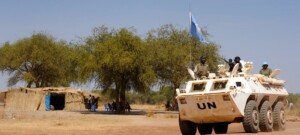OCHA: Access to water main challenge in Sortony, North Darfur
Water and sanitation services remain below standards at the displaced site near the Unamid base in Sortony, North Darfur, where according to the International Organisation for Migration 62,129 newly displaced from Jebel Marra have taken refuge.
Water and sanitation services remain below standards at the displaced site near the Unamid base in Sortony, North Darfur, where according to the International Organisation for Migration 62,129 newly displaced from Jebel Marra have taken refuge.
As of 13 March, the total number of reported displaced who fled the new bout of violence in Jebel Marra since mid-January, reached 110,273 people. About 95 percent (close to 105,000) sought refuge in North Darfur.
About 4,000 newly displaced people are reportedly sheltering in Central Darfur, and another 1,390 fled to safer places in South Darfur. There are also unconfirmed reports of up to an additional 80,000 displaced in Central Darfur as a result of the Jebel Marra conflict, the UN Office for the Coordination of Humanitarian Affairs (OCHA) reports in its latest weekly bulletin.
Sortony
While assistance is being provided to the more than 62,000 displaced in Sortony, significant shortages remain. With the exception of food and health, there are gaps in most of the sectors.
Water and sanitation services remain below standards. People currently receive 1.5 litres per person per day, which is far below the Sudan Emergency Response Framework (ERF) standard of 7.5 litres per person per day. This is less than the 2.5 litres per person per day they received last week, probably related to the increased strain on existing services, OCHA reports.
So far, the drilling of boreholes has been unsuccessful and Unicef is exploring other options such as bringing-in water by lorry from Kabkabiya. Progress has been made in latrine construction and health promotion activities but more needs to be done. There are also 5,123 displaced people who are still waiting for emergency shelter and household supplies.
The Sudanese Red Crescent Society (SRCS) is currently distributing one-month food rations from the World Food Programme (WFP). The national NGO Anhar distributed nutrition supplements to 8,197 children under five years and pregnant and nursing women, to cover their needs for 15 days.
Health services are provided through three temporary clinics in the area. One clinic is run by Doctors without Border/Médecins Sans Frontières-Spain (MSF-E), and the two other clinics by Anhar; the World Health Organization (WHO) and Unicef provided Anhar with medical supplies to cover the needs for 52,000 people for one month.
On 7 March, MSF-E, with the support of the North Darfur Ministry of Health, Unicef, and WHO – launched a measles and polio (with vitamin A) vaccination campaign targeting 26,480 children from 6 months to 15 years. The campaign is ongoing.
The Sudanese Kabkabiya Smallholder Charitable Society (KSCS), with Unicef support, has formed a community-based child protection network to support child-friendly space animators in the implementation of child protection activities at the community level. A gender-based violence group has also been established to help sensitise communities.
Rebel strongholds
The Jebel Marra massif lies in the centre of the Darfur region, bordering the state divisions of North, Central, and South Darfur. It is a fertile region inhabited mainly by the Fur tribe and has since 2003 been the primary stronghold of the Sudan Liberation Movement, a Fur-dominated group.
It is the only place in Darfur where an armed opposition group maintains prolonged control over territory and the only area in Darfur to which humanitarian organisations have had no access since 2011, OCHA explains in its Jebel Marra Fact sheet of 30 September 2015.
On 15 January, the Sudanese government launched a major offensive on rebel strongholds in Mount Marra, the main mountain of the massif. The bombardments by the Sudanese Air Force and attacks by government forces caused the Jebel Marra population to flee their homes and seek refuge in nearby towns and camps for the displaced. Thousands of people are reportedly still taking shelter in caves and valleys up in the mountain.
Aid organisations continue to deliver humanitarian assistance to displaced people from Jebel Marra in accessible areas, mainly in North Darfur. By 13 March, more than 96,000 newly displaced people received emergency food and other forms of assistance.
There are also unconfirmed reports of an additional number of up to 80,000 displaced in Central Darfur as a result of the Jebel Marra conflict. The UN and partners have been unable to verify this reported displacement because of lack of access, despite several requests, the OCHA bulletin reads.
For more information on needs, responses, and gaps, see the latest Jebel Marra Fact Sheet.











 and then
and then